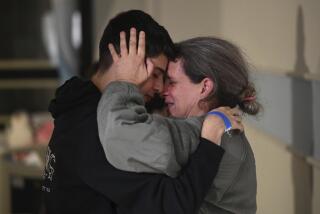Flags Fly for Ex-Hostages in W. Germany
- Share via
WIESBADEN, West Germany — Highlighted in the pale morning sun, 50 American flags--one for each state--bedecked the main entrance to a U.S. Air Force hospital here today as the medical staff inside prepared to receive the 39 American hostages for their first full day of freedom.
The freed hostages arrived at the U.S. Rhein-Main Air Base in Frankfurt, 20 miles east of here, at 5:25 a.m., local time, and were brought by bus to the hospital.
American officials want the liberated hostages to remain for more than two days at the Air Force Regional Medical Center in Wiesbaden for medical checkups and intensive questioning by government specialists about exactly what happened aboard the hijacked TWA Boeing 727 and in Beirut.
“They have been through a harrowing experience,” a State Department official told a news conference. They are going to have to be decompressed.’
After some sleep, the men faced a battery of medical tests and questioning from various government specialists who, according to the State Department official, “wanted to find out precisely what happened on the plane and what we might do to prevent it from happening again.” The official, however, refused to identify the specialists or their agencies.
He said, in response to a question, that the men would be asked about the news conferences they gave while they were in Shia hands, but he said that this would not be a significant part of the questioning.
As news came Sunday that the hostages had left Beirut, tension among their relatives already waiting here and in Frankfurt eased. After previous disappointments, they remained skeptical, until the freed hostages finally stepped off the Air Force plane .
The first relatives arrived in Frankfurt from the United States early Sunday, after Saturday’s premature announcement that the hostages had been freed in Beirut.
Today marked the third time in 4 1/2 years that both Rhein-Main and the U.S. Air Force Regional Medical Center have handled American victims of Middle East political violence.
On a frozen January night in 1981, the 52 Americans held hostage in Iran for 444 days were treated here, as were survivors of the suicide truck-bombing of the Marine Corps barracks at the Beirut airport that killed 241 U.S. servicemen in October, 1983.
On the base operations building in Frankfurt reads the inscription: “Welcome to Rhein-Main, Gateway to Europe.”
Pointing to the sign, Air Force Capt. Lorrie Bourland, chief public affairs officer at the base, noted, “It should be ‘Gateway to Freedom.’ Any time something happens in the Middle East, they come back through here.”
More to Read
Sign up for Essential California
The most important California stories and recommendations in your inbox every morning.
You may occasionally receive promotional content from the Los Angeles Times.













